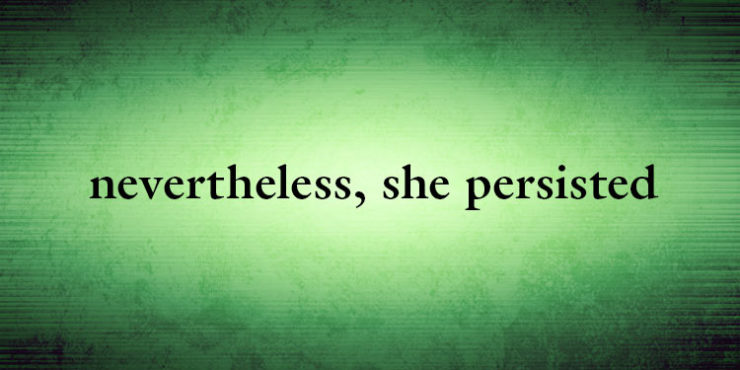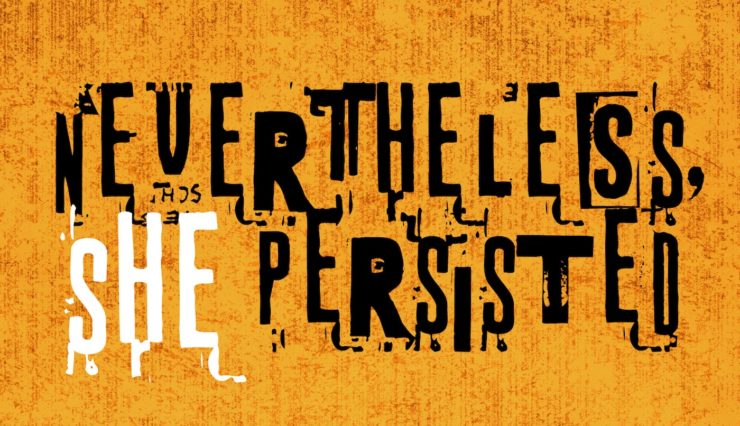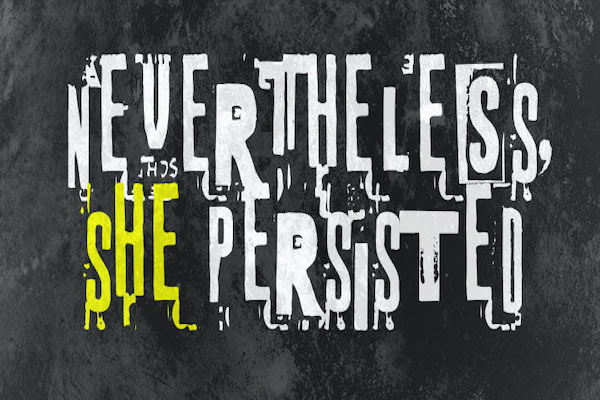On International Women’s Day, several of the best writers in SF/F today reveal new stories inspired by the phrase “Nevertheless, she persisted”, raising their voice in response to a phrase originally meant to silence.
The stories publish on Tor.com all throughout the day of March 8th. They are collected here.
Margot and Rosalind
- She was warned.
The doorbell rings as she’s giving the brain its nutrient bath. The Hyperbrain likes it when she scritches behind its temporal lobe, like a cat—if a cat was a biomimetic neural network that filled up your entire basement. Margot whispers stories about heroes to the Hyperbrain, which likes Rosalind Franklin best.
Margot changes as she walks along the hall of her creaky rowhouse, lined with photos of dead people: her wife Sukey, other lovers, all worry-smiling. By the time Margot reaches her door, she’s playing up her non-threatening slouch and the way she favors one leg.
The man from the Brain Brigade looks uncomfortable to be in the Lowdown, talking to someone like Margot. “Ma’am. Miss. Ms. Baxter,” he says. “We’ve had reports of an unlicensed A.I., in contravention of 37 use cases.”
She glances past him, upward, at the place he comes from. Crystal skyways cris-cross, rippling with light. Above it all dwell the Immortals, playing their Wall games. Occasionally a gamepiece falls and blocks the street down here. Everyone’s GPS just re-routes around the obstruction.
The man talks for ages, but has no warrant. Margot keeps saying, “I’m sure I don’t know what you’re speaking about,” but doesn’t let him inside.
- She was given an explanation.
The brain, which Margot has taken to calling Rosalind, already knows everything and predicts the weather years from now. But Rosalind still purrs louder whenever Margot tells stories of people who stood up for truth. Borrowing those seeds was the best decision Margot ever made.
The Brain Brigade keeps sending notices, which float outside, singing the legal code to the tune of a Bach fugue. She drowns them out with some good zydeco. Pale, fragile men shiver on her welcome mat. She stopped answering the door.
Then an ice sculpture comes from Margot’s refrigerator. A bull of a man, with a cunning smile. The statue looks around and raises a frozen hat.
“Ms. Baxter, my name is Arthur. I run the Brain Brigade. I must counsel you: An uncontrolled Hyperbrain could cause unimaginable chaos. Most of all, under no circumstance should you attempt to connect your own mind to your illicit Hyperbrain.”
“Ha,” Margot says. “That’s reserved for the Immortals up top, is it?”
“Actually,” the figurine says, “no. None of the Immortals has connected to their own Hyperbrain in over a century. The Hyperbrains engineer wealth and eternal youth for people, and we leave them to it.”
“You have the most advanced consciousnesses in creation,” Margot almost spills hot tea on herself. “And… you don’t even use them to think?”
The iceman laughs, not entirely at Margot. “Believe me, there’s nothing worse than being both immortal and intelligent. Imagine the boredom! Plus you start to ask questions, and the worst thing about questions is that sometimes, they have answers.”
The statue melts, leaving a wet mess on her parquet.
- Nevertheless, she persisted.
Every network airdrops a reporter onto Margot’s lawn, and they intone that Margot is destroying the fabric of society. Why does Margot hate ordinary people? What gives her the right to be better than everybody else? A salt-of-the-Earth man named Jeff the Chair Maker has built a chair that bursts into flames every five minutes. All the reporters want Jeff to shout at them on camera. The police wear riot gear to hold back the mob. Men and women in white spacesuits prepare to breach Margot’s house, but they’re alarmed by Jeff’s self-immolating chair.
Margot’s toaster makes toast with Arthur’s mustachioed face on it. “Ms. Baxter. I must counsel you. Nobody knows what might happen if a human tried to think using a Hyperbrain. The consequences—”
The pounding at Margot’s door sounds like a stampede.
Rosalind’s purring sounds different, like it’s time. Knowledge is justice, the rumbling seems to say. Margot reaches for her brain-interface, which looks like a diamond colander, and lowers it onto her own crown. This Singularity will be most singular, she thinks, and then her mind opens wide.













